In an industry as competitive as construction, standing out requires more than just quality craftsmanship—it demands a robust marketing foundation. Implementing the right marketing strategies is necessary to support business growth.
However, getting started or revamping your marketing strategies can be an overwhelming and difficult task, especially in the construction business. That’s why we’ve created this guide—to map out everything there is to know about construction marketing.
In this blog, we’ll teach you how to market a construction company by guiding you through the different marketing strategies and tactics designed to elevate your brand and attract the clients that drive success.
What Is Construction Marketing and Why Is It Important?
Construction marketing is the strategic planning and execution of communication and outreach efforts for a company or firm within the construction industry. This can include residential, commercial, or industrial building services, as well as infrastructure development. The main goals of construction marketing are to build brand awareness, generate leads, nurture client relationships, and ultimately secure contracts for construction projects.
So, why is construction industry marketing important? According to Finances Online, the worldwide construction industry is experiencing significant growth and is expected to hit the $8 trillion mark by 2030. A considerable portion of this expansion has been taking place in the United States, which is anticipated to continue upward.
Given this growing volume of professionals working within the construction sector, it’s the perfect moment (and a necessity) for construction firms to launch comprehensive marketing tactics.
Construction marketing is important because it directly influences a company’s ability to secure new business and grow. In an industry saturated with competitors offering similar services, a well-crafted construction marketing strategy can set a company apart, showcasing its unique skills, advanced technologies, and successful projects.
Through targeted campaigns, customer testimonials, and a strong online presence, construction firms can build a reputation for reliability and quality, which is invaluable for winning bids and contracts.
Challenges Construction Companies Face When Growing
The market is often crowded, with many construction firms competing for the same projects. You want to win more business, but differentiating your services and value proposition from competitors can be difficult.
If you can make yourself stand out from the competition, you still have to continue building and maintaining a solid client base. This requires effective marketing and relationship management. Therefore, as your company grows, sustaining high levels of customer satisfaction and repeat business can become more challenging.
Here are some common marketing challenges construction companies may face:
- Need for more marketing knowledge within the company.
- Limited resources dedicated to developing digital marketing initiatives.
- Mistakenly confusing marketing with selling.
- The engineering mindset, which prioritizes production as the business’s central focus, overshadows other practices.
Additionally, technological adaptation remains a challenge in the construction industry. One of the most challenging issues facing the construction industry is its reluctance to embrace new technologies.
Digital innovations such as Building Information Modeling and 3D Printing have the potential to simplify the work of construction professionals significantly. This integration of such cutting-edge technologies can also enhance safety for both workers and contractors on-site.
However, incorporating new construction technologies for better efficiency and competitive advantage requires investment and training. Therefore, even when construction companies do recognize the potential advantages of these technological solutions, from design through to execution, securing the necessary funding often proves to be an obstacle.
Although there is a clear need for digital advancement, the construction industry continues to stay behind other sectors in embracing digital transformation.
The Benefits of Construction Marketing
Now that we’ve looked at some of the marketing-related challenges construction firms may face, let’s take a look at the benefits construction marketing can bring to your firm.
Different marketing benefits make up the marketing funnel for growing your construction business. While building trust and credibility is necessary throughout every stage of the funnel, each stage (from top to bottom) also focuses on a specific benefit.
As seen below, in the “Awareness” stage, you want to focus on brand awareness, in the “Consideration” stage, you want to focus on sourcing qualified leads, in the “Purpose” stage, you want to focus on closing more deals, and in the “Loyalty” stage, you want to focus on customer retention.
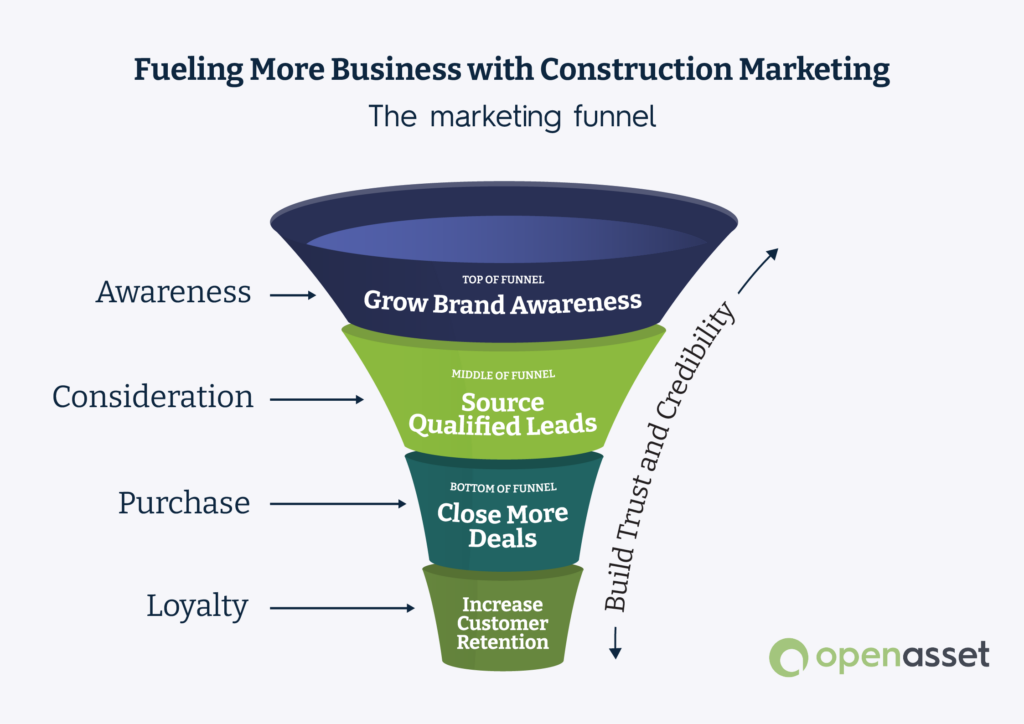
Builds Trust and Credibility
In the marketing funnel, trust and credibility are elements that apply to each stage of the funnel because of their importance throughout the entire marketing process. In the construction industry, trust is the cornerstone of success; only businesses that earn trust will consistently land bigger projects.
Establishing a trustworthy reputation is crucial for a construction business. It influences whether a potential client will choose your services or choose a competitor. Marketing plays a pivotal role in shaping your brand’s reputation, including aspects such as the quality of your work and how you take care of your customers.
One way to build trust and establish credibility? Content. Creating high-quality blogs and video content helps build company credibility. Besides blogs and video content, you should also leverage testimonials from satisfied customers to improve your brand’s credibility. Testimonials stand as the top case studies of success. Satisfied customers showcase the benefits your construction services have brought to their projects.
A well-executed marketing strategy in the construction sector helps establish a firm’s reputation as a reliable and professional entity. This foundation of trust is crucial in an industry where projects often involve significant financial commitments and safety considerations.
Growing Awareness With Target Audience
Effective marketing increases a construction company’s visibility among its desired customer base. Through targeted advertising, SEO-optimized content, and a strong social media presence, firms can highlight their expertise and services to those most likely to need them. As brand awareness grows, so does the likelihood of securing new projects.
Engage your target audience by tailoring marketing strategies to suit their preferences, behaviors, and specific project requirements. By directly addressing the needs of these prospective clients, you’re more likely to capture their interest and increase the chances that they’ll use your services.
The advantage of using social platforms like Facebook and Instagram lies in their highly specific targeting capabilities. The initial step when leveraging these platforms should be to define the geographic location you want to reach.
Following location targeting, dig into the demographics (income, interests, behaviors, etc.) of your target audience. You may find that you have multiple target audiences, and it could be beneficial to craft different campaigns that resonate with each group. There are many choices at your disposal, so experiment to discover what is effective. This will lead to engagement directly with your intended audience and securing additional projects via social media.
Another method to enhance your visibility is by optimizing your online presence, starting with the creation of your Google My Business (GMB) profile. GMB is Google’s designation for your business listing on their platform. Establishing your GMB and maintaining active social media accounts ensures that prospective clients can easily locate you on the internet.
Source Qualified Leads for Sales
A qualified lead is a prospective customer who has been identified as meeting certain criteria that suggest they have a higher likelihood of becoming a customer. Typically, a qualified lead has been evaluated based on their demographic information, behavior, engagement with your business, or their specific need for your product or service. These leads are usually generated by the marketing team and then assessed by the sales team for potential conversion.
Marketing efforts, especially those geared towards digital platforms, can generate high-quality leads by engaging potential clients through various stages of the sales funnel. These marketing efforts extend beyond simply boosting lead generation for construction companies; they enhance the quality of those leads.
Such qualified leads are further along in the sales funnel compared to other leads. They possess a certain level of awareness about your construction firm and are closer to deciding on a purchase. These leads require less nurturing, potentially leading to quicker conversions and more wins for your company.
By employing strategies like digital content marketing that answer client questions and showcase thought leadership, construction firms can attract leads who are already interested in the kind of services they offer, making the sales process more efficient.
Close More Deals
As your construction business starts to draw in more qualified leads secures higher customer retention, and strengthens its brand, you’ll see an increase in sales. Consistency in marketing efforts is key to keeping this positive trend going.
With a strong marketing strategy, closing deals becomes a more streamlined process. Marketing materials and campaigns that clearly communicate a company’s value proposition can persuade prospects to choose one firm over another.
Moreover, leveraging tools like Digital Asset Management (DAM) software can enhance this benefit further. How? Well, it’s simple— Centralize AEC assets. Create more proposals. Win more business. With DAM for construction, you can make the construction proposal process simpler, faster, and more successful by closing more deals.
Increased Customer Retention
Marketing doesn’t end with a closed deal. Continuous engagement and post-project follow-ups can turn one-time clients into repeat customers. Engaging with customers contributes to their continued loyalty.
Moreover, as customers come to trust the consistent quality of your construction business, their loyalty to your brand grows. This heightened trust can make them more inclined to recommend your company to friends, colleagues, or relatives. Good marketing ensures customers feel valued and informed long after the initial sale, enhancing loyalty and encouraging word-of-mouth referrals.
Construction marketing can include creating newsletters, conducting satisfaction surveys, and providing maintenance tips, which keep your company in the client’s mind for future projects. A deeper understanding of your customer’s requirements, as informed by your buyer personas, will lead to the creation of more refined and satisfying customer experiences.
Construction Company Marketing Strategies and Tactics
Effective AEC marketing best practices are essential for construction companies wanting to carve out a significant presence in the competitive construction industry. A multi-faceted approach that leverages marketing strategies and tactics can help a company attract new clients, engage with current ones, and build a brand that’s synonymous with quality and reliability.
If you’re wondering how to market a construction company, here are 12 essential construction marketing ideas you should be implementing:
1. Build an Optimized Website
Your website serves as a crucial marketing hub for your construction business. For construction companies, a website serves as the digital storefront, offering a first impression that can either build interest or drive potential clients away.
With 81% of consumers going online to investigate local businesses, a website becomes the digital face of your company and is imperative for its success. Lacking the online presence of your construction website means you’ll be missing from search engine results when prospective clients are on the search for your services.
Additionally, remember the importance of trust we discussed earlier? Well, a significant 26% of U.S. consumers don’t trust companies without a website, yet 45% of small businesses still don’t have one.
The cornerstone of any digital marketing strategy today is a well-optimized, user-friendly website. Quality design is essential, ensuring easy navigation with a well-structured menu that guides visitors to the information they’re seeking. Strategic use of calls-to-action (CTAs) can direct visitors towards contacting the company, requesting a quote, or viewing past projects, which moves them down the sales funnel.
Successful construction websites are more than aesthetic appeal; they actively encourage visitors to engage and initiate business with you. An effective website will combine aesthetic appeal with functionality, providing a foundation for the various elements that inform and engage visitors.
Consumers frequently visit a business’s website to learn more about the company before interacting with them. An optimized website includes the following:

About Page
The “About” page is where a construction company can share its story, mission, and values. This section showcases what sets your business apart, spotlighting your company’s story and the core principles you uphold. It humanizes the company, introduces the leadership team, and details the firm’s history and achievements.
This page can forge a connection with the audience by conveying the company’s commitment to quality, safety, and customer satisfaction.
Services Page
Clear and comprehensive “Services” pages are crucial. They should outline the full range of services offered, from initial design and planning to construction and post-construction follow-up.
Each service can be detailed with sub-pages that delve into the specifics of what the company offers, setting clear expectations for potential clients. This is a great way to inform your readers about what you offer.
Portfolio Page
A “Portfolio” or “Projects” page acts as a showcase of the company’s capabilities and skills. High-quality images or videos of completed projects and past work allow potential clients to visualize the type of work the company produces. Including a range of projects from your best work that demonstrates versatility and experience.
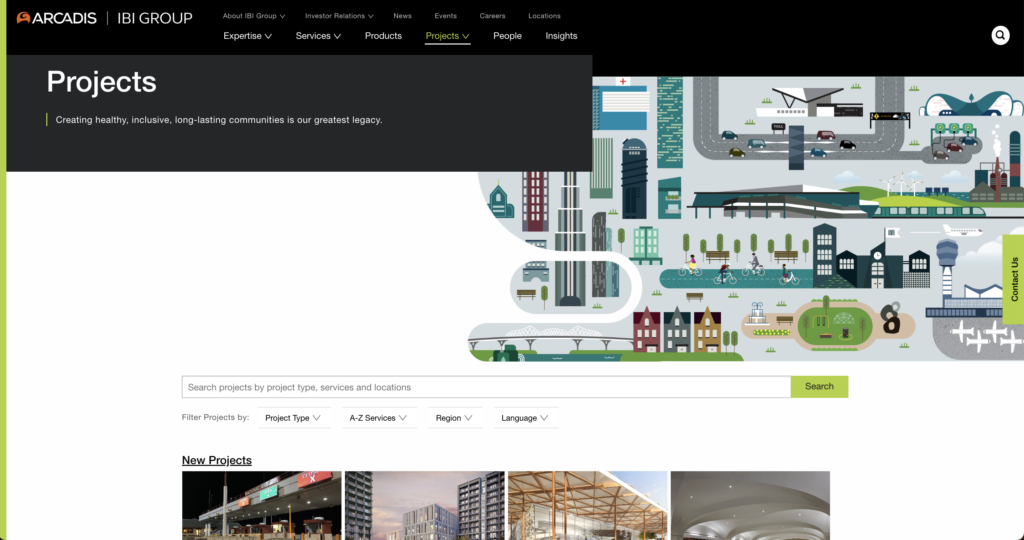
Blogs
A regularly updated “Blog” page or “Resource Center” can provide valuable insights into the construction industry, offer advice, and highlight trends. It’s also a tool for improving SEO rankings by incorporating keywords that potential clients might use to find construction services. A blog positions the company as a thought leader and a reliable source of industry knowledge.
Content marketing is about providing valuable, relevant information on your construction website. When consumers search for solutions to their questions, they’re attracted to your site through SEO-optimized web copy or blog posts. As visitors gain familiarity with your brand and the services you provide, they may transition from casual viewers to paying clients.
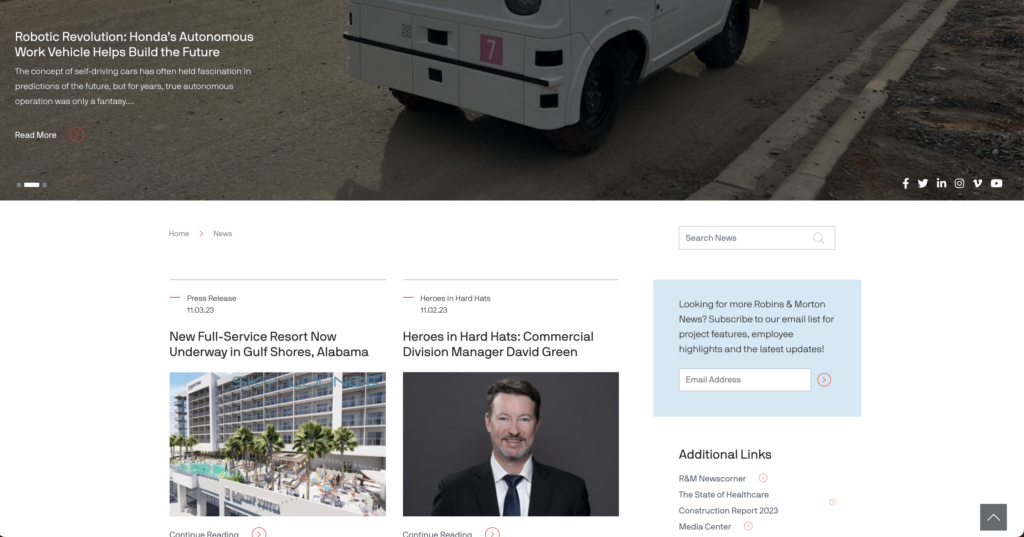
Case Studies and Testimonials
As mentioned earlier, case studies and testimonials are powerful forms of social proof that build trust and credibility. Detailed case studies highlight particular projects, the challenges faced, and how they were overcome, showcasing the company’s problem-solving abilities. Testimonials from satisfied clients add a level of trust and personal recommendation that can be persuasive to prospects.
Gallery Page
A “Gallery” page is ideal for showing pictures and videos that display your firm’s most impressive work. Filled with high-resolution images, this allows visitors to quickly see the extent of a company’s experience and quality. A well-organized gallery with categorized projects makes it easy for users to find relevant examples of the company’s work that align with their needs.
Contact Page
Finally, a “Contact” page is necessary. It should provide multiple ways for a potential client to reach out, including a phone number, email address, contact form, and possibly a live chat feature.
The page can also include the physical address of the company’s office, a map, and even a FAQ section to address common inquiries. This page must be simple, intuitive, and function flawlessly to encourage connections and lead generation.
2. Social Media Marketing and Paid Social Media Advertising
In the digital age, social media marketing has become an indispensable tool for construction companies to reach and engage with their target audiences. It offers a dynamic platform for organic interaction and paid advertising, each serving distinct purposes within a comprehensive marketing strategy.
Organic Social Media Marketing
It’s no secret that social media is rapidly emerging as a highly effective digital marketing tool across various industries. These widely used platforms offer construction companies a direct line to potential clients, presenting a significant chance to establish trust with a targeted following.
Organic social is about authenticity and creating conversations, which can be crucial for building long-term brand loyalty and engaging with potential clients. It focuses on building and nurturing relationships with your audience without direct costs.
By posting regular updates, photos from construction sites, behind-the-scenes looks at projects, and sharing industry-related content, and more high-quality content, a construction company can grow its brand presence and establish a community around its work.
Additionally, social media serves as a strong referral tool, enabling followers to effortlessly share the content and pages of construction companies with their online networks. It also allows you to showcase your outstanding customer service by quickly answering messages and comments from customers.
Moreover, professional networking websites provide an excellent opportunity for large-scale construction firms to engage with businesses looking for project proposals and to join an online community of prospective vendors.
Paid Social Media Advertising
With social media, you can engage specific niches through targeted posts and social advertising.
While organic reach is vital, it can be limited by the platform’s algorithms. This is where paid social media advertising comes in. One of the best features of social platforms such as Facebook and Instagram is their ability to allow highly precise targeting.
Construction companies can use paid ads to target specific demographics, such as businesses in need of construction services.
Paid campaigns can be designed to increase brand visibility, promote special offers, or drive traffic to a website or landing page. They offer advanced tracking and analytics, enabling companies to measure ROI and adjust campaigns for maximum effectiveness.
Both organic and paid social media play crucial roles in a construction company’s marketing strategy. Organic efforts help establish a foundation of trust and industry authority, while paid advertising can quickly amplify reach and generate leads.
By balancing the two, a construction company can create a powerful social media presence that supports both short-term and long-term business goals.
3. Gain Qualified Leads With PPC and Google Ads
PPC (Pay-per-click), also referred to as Paid Advertising, is an extremely efficient method to ensure your business reaches the appropriate audience and generates a greater number of qualified leads.
With PPC, you only pay when a viewer actively interacts with your advertisement, which means you can optimize your marketing spend while increasing the efficiency of your lead generation efforts.
Moreover, Google Ads, specifically, is highly beneficial for its robust targeting capabilities. Construction companies can create ads focused on specific keywords that potential clients might use when looking for construction services. This precision allows for the company’s ads to appear to users who have a high intent of hiring a construction service, thus increasing the likelihood of the ad converting into a lead.
Furthermore, Google Ads provides flexibility in budgeting, allowing construction companies to start small and scale up as they begin to see the return on their investment. The nature of PPC— only paying when someone clicks on your ad— makes it a cost-effective strategy for many businesses.
Additionally, Google Ads’ detailed analytics helps marketers understand which keywords and ads are performing well, enabling them to optimize their campaigns for better results continuously.
Incorporating PPC and Google Ads into a construction company’s digital marketing strategy can significantly increase the chances of reaching the right audience at the right time, driving traffic, and ultimately, generating more leads and sales. It’s an invaluable tactic for companies that want to gain a competitive edge in the digital space and see a direct impact from their marketing investments.
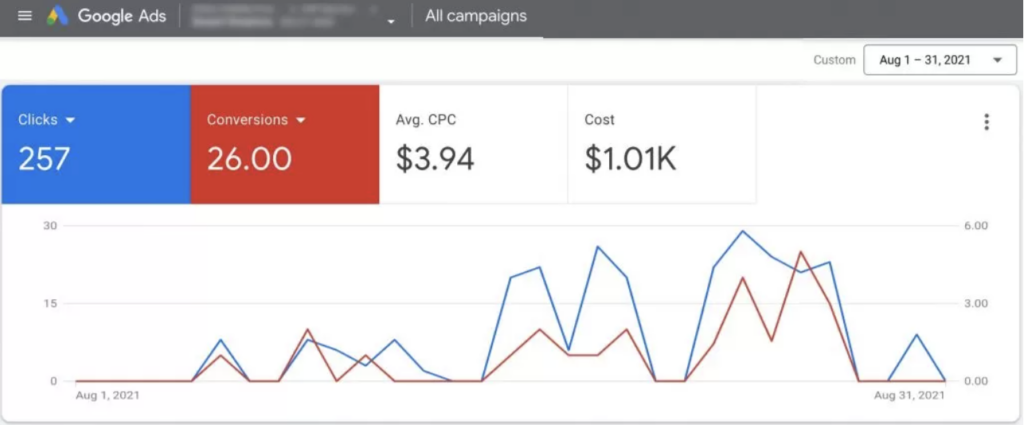
4. Leverage Video Marketing
Video marketing is a compelling way for construction companies to showcase their expertise, projects, and company culture. In fact, research shows that incorporating video leads to a 157% boost in organic traffic from search engine results pages (SERPs) for businesses.
Considering the stunning outcomes of construction projects, it makes sense to showcase them through captivating video content. By showing off your best building knowledge and skills through video, you position yourself and your business as a reliable and trusted industry expert.
Additionally, video content can be used across multiple platforms, including the company’s website, social media, and newsletter, making it a versatile tool to increase engagement and reach.
Here are just a few construction marketing ideas of what you could do with video content:
- Video tours of completed construction projects
- Live Q&As
- Webinars
- Time-lapse video of the construction process
- Demonstrate available services and/or products
- Explain processes
- Company culture video
- Case study videos of your successful projects
- Client testimonials
- “About Us” video
By leveraging video content, from time-lapse footage of projects to interviews with key personnel, companies can give a dynamic and engaging perspective of their processes.
Moreover, video content serves as an excellent way to improve your brand personality. This approach can make your company more relatable and assist in having a stronger, more engaged audience.
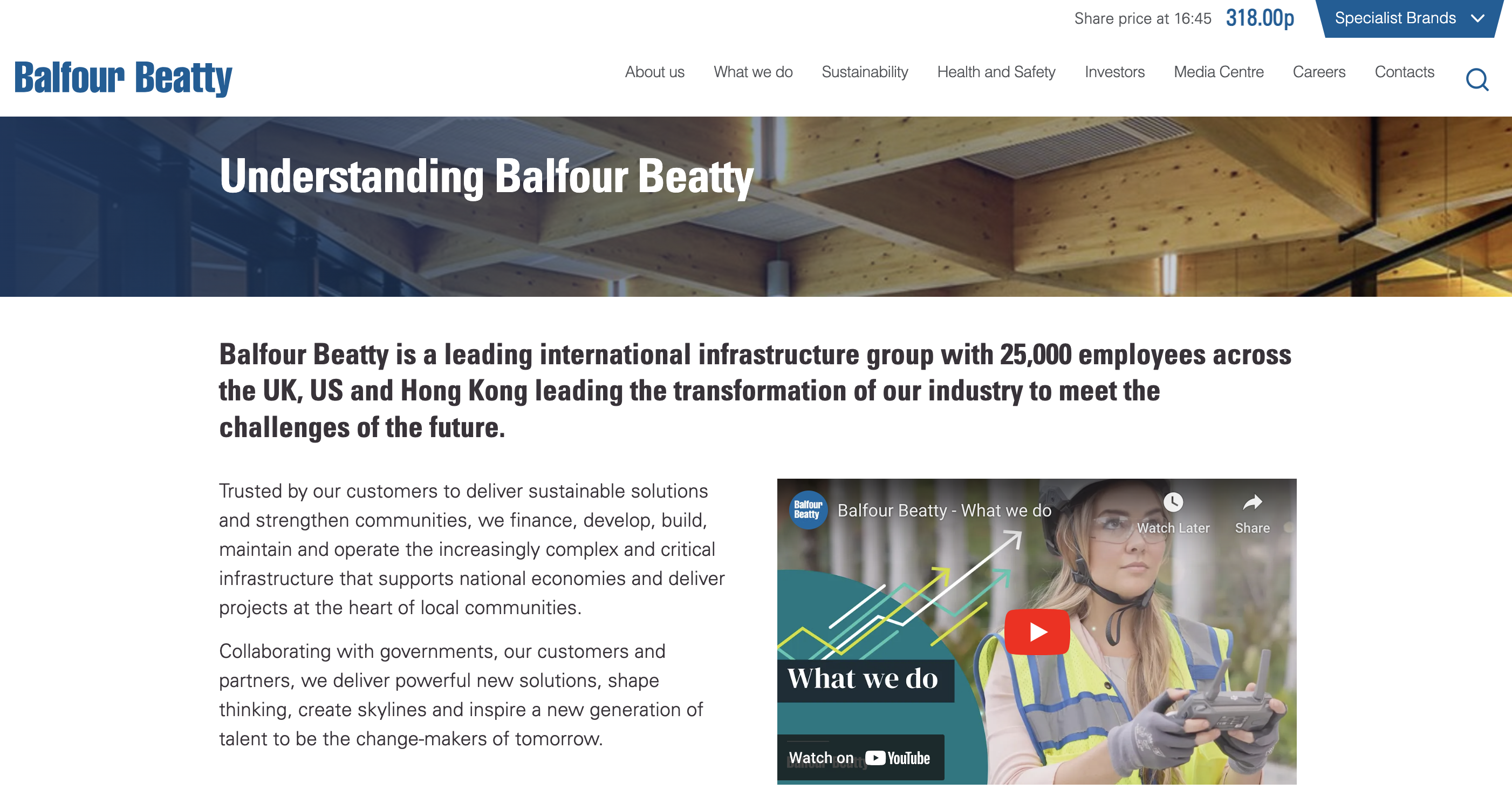
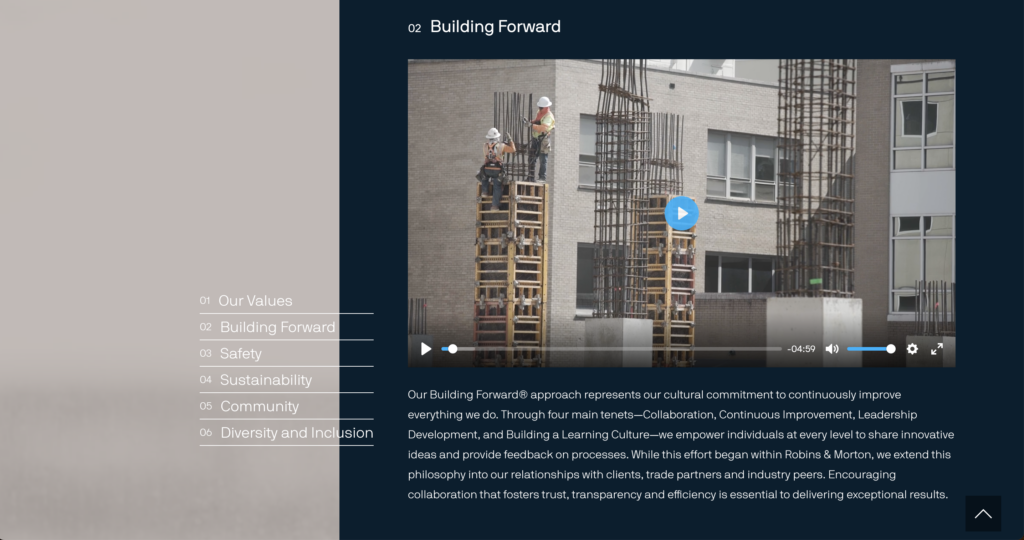
5. Engage Clients through Email Marketing
Email marketing remains one of the most effective channels for direct communication with clients. Email is a versatile tool for reaching out to potential and existing customers at different points in the sales process.
The material you distribute through email should be both engaging and informative, addressing the questions and doubts of potential leads and leading them further along the sales funnel.
Simultaneously, it’s crucial to maintain the interest of long-term clients with compelling newsletters and exclusive perks that reward their continued loyalty, ensuring they look forward to your emails.
For construction companies, sending out a regular newsletter can keep subscribers informed about recent projects, company news, and industry insights.
Newsletters are a great way to stay in touch with both old and new clients through regular updates on projects and insights into the construction industry. It’s also an opportunity to nurture leads with personalized content and updates, which can guide potential clients through the buyer’s journey.
Utilizing email marketing not only keeps your clients involved but also leads to brand loyalty. A well-crafted email campaign can drive traffic to the website, enhance customer retention, and increase brand loyalty.
6. Optimize Visibility With SEO
Search Engine Optimization (SEO) is critical for construction companies to improve their online visibility and attract more organic traffic.
According to Backlinko, only 0.63% of users searching on Google will go to the second page of results. Therefore, your construction website needs to achieve a ranking as high as possible in search results.
Essentially, your business should appear on the first page of Google search results when someone looks up construction companies or contractors in your area. To boost the SEO ranking of your construction firm, start prioritizing the following elements:
- Creating high-quality backlinks
- Writing meta descriptions
- Implementing internal linking
- Conducting keyword research
- Developing content based on specific keywords
- Enhancing image optimization
- Combining or removing repetitive content
- Refreshing and updating old content
To improve your position in SERPs and increase organic traffic to your website, think about conducting an SEO audit, particularly if you’re facing challenges in these areas.
By optimizing website content with relevant keywords, maintaining a mobile-friendly site, and producing regular, quality content, companies can rank higher in search engine results pages (SERPs). This increased visibility often translates into more website visits, inquiries, and, ultimately, conversions.
Local SEO
Local SEO is particularly important for construction firms looking to attract business within a specific geographic area. It’s a more centralized approach to SEO. Conducting local keyword research and creating content tailored to your regional audience is recommended.
By optimizing for local search terms, maintaining accurate and complete Google My Business (GMB) listings, and garnering local backlinks, companies can improve their visibility to nearby customers who are likely to require their services.
7. Building Trust with Customer Reviews and Testimonials
As we mentioned earlier in the blog, a great way to build trust is through customer reviews and testimonials. Your construction firm may include positive customer reviews on your websites, social media pages, or email campaigns to establish the quality of your work and a high level of customer satisfaction. A great testimonial is showing before and after pictures of your previous projects.
Potential clients may rely on these reviews to make informed decisions for their construction needs, and highly visible, positive testimonials could influence their choice of company.
Customer reviews and testimonials are incredibly influential for potential clients making hiring decisions. Encouraging satisfied customers to leave positive reviews on platforms like Google, Yelp, and social media can significantly boost a company’s reputation. Featuring these testimonials prominently on the company website can further solidify trust and credibility and play a significant role in guiding consumers’ decisions when selecting a contractor.
8. Feature Your Employees in Marketing Materials
Developing an employee spotlight page is an effective approach to building your brand. Highlighting employees through marketing materials adds a personal touch to your company’s brand image. This makes your company appear more relatable to your audience, which in turn builds trust.
Featuring your employees offers an inside look at your company’s culture and the principles of your team members, building a sense of value and inclusivity among your employees while also giving viewers a glimpse into the heart of your brand.
Keep in mind that the primary objective of an employee spotlight is to highlight your company’s work culture and environment. As we touched on earlier, a great way to do this is through video! Videos can include team and workplace culture videos or videos discussing your company’s core values.
Sharing stories, accomplishments, and day-to-day experiences of employees not only demonstrates the company’s investment in its team but also humanizes the brand. This strategy can resonate with potential clients and improve employee morale, serving as a recruitment tool as well.
You’ll also want to select the best employees for a project and include their resumes in your RFP responses. This will help the potential client get a better understanding of the chosen team for the project.
However, you already have to worry about marketing efforts and creating winning proposals, which is why you need DAM software. OpenAsset lets you create resumes at speed, so you can focus on what matters— growing your construction business.
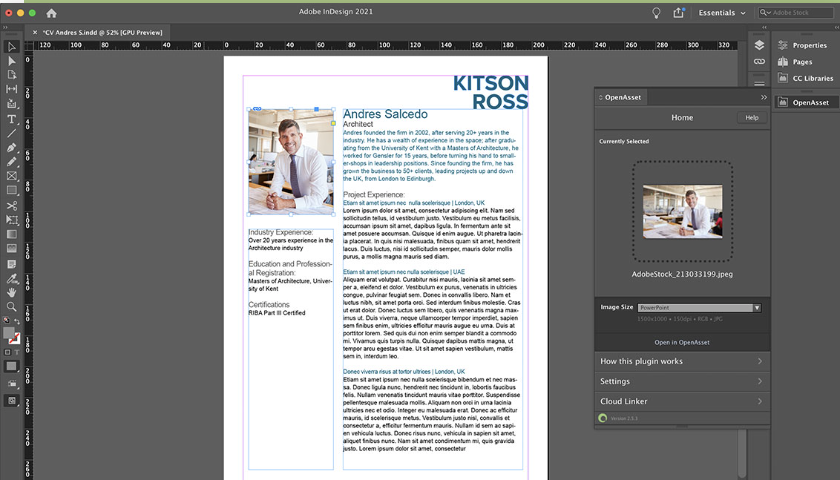
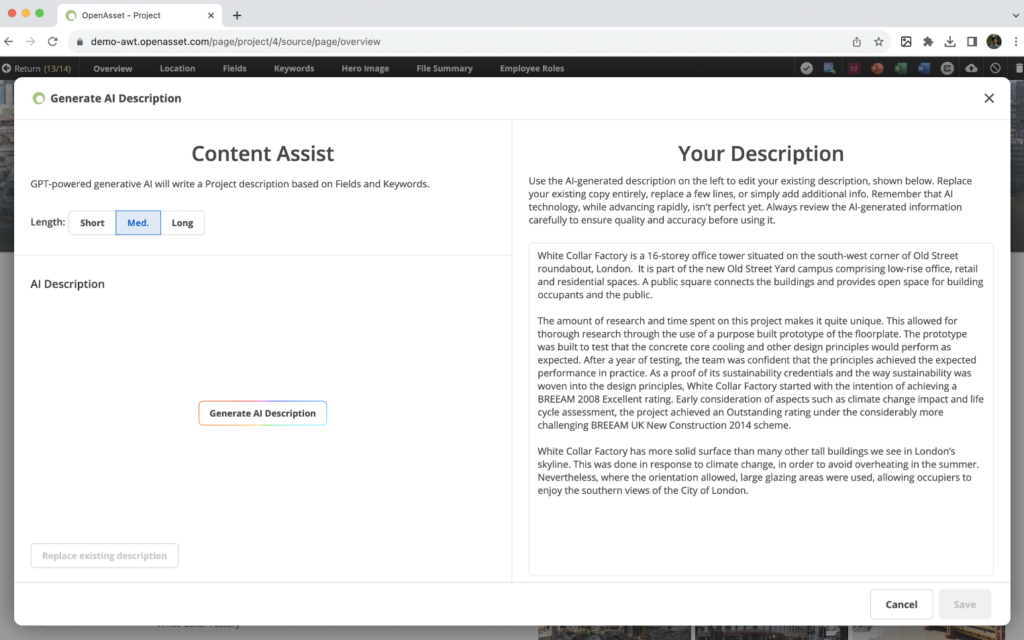
TIP: Want to know how OpenAsset can streamline resume creation at your AEC firm? Read our Taylor Australia Case Study now.
9. Expand Reach with Co-Marketing and Partnerships
By engaging in co-marketing and partnerships, construction companies can tap into new audience segments. Forming partnerships with like-minded businesses for community events, joint promotional campaigns, and advertisements enables construction companies to connect with potential clients who might have been out of reach otherwise.
Construction companies typically collaborate with brands that provide complementary services but are not direct competitors, have a big audience, and offer mutual benefits through the partnership. You can partner with local architects, designers, and suppliers to expand your network and introduce your services to a broader audience.
Co-marketing or partnership marketing can be an effective way for construction companies to expand their reach. By partnering with other businesses or industry influencers, companies can tap into new audiences, share resources for marketing campaigns, and increase their market presence. These partnerships can be especially beneficial for specialized projects or when entering new markets.
10. Educate Your Audience With Content Marketing
Content marketing helps construction companies to establish thought leadership and keep their audience engaged. The objective of this content is to deliver value to your audience. However, this will require keyword research to find out what your target market is actively searching for.
Content marketing for construction can include:
- Videos
- Blog posts
- Infographics
- eBooks
- White papers
- Case studies
- Guest posts
By creating and distributing valuable content, companies can educate their audience, address their questions, and provide solutions to their problems. High-quality content can also improve SEO and drive organic traffic to the company’s website.
11. Host Webinars and Events
Hosting webinars and events can position a construction company as an expert in its field. These platforms offer opportunities to showcase knowledge, network with peers, and engage with potential clients. Hosting events and webinars is also cost-effective and can attract a broad audience. However, you can customize the content to attract your target audience and suit their interests.
Webinars can be particularly effective for demonstrating expertise on specific topics, while events provide an experience and direct interaction with your brand.
12. Keep Branding Consistent
If you haven’t paid much attention to your digital brand, or if your company’s branding is due for a refresh, it would be beneficial to prioritize this aspect.
But how do you define and present your brand? Defining and showcasing your brand involves several key elements. It requires a visually striking logo, a distinct brand voice or tone, and color choices that reflect your company’s core brand values.
Additionally, sharing your brand’s unique story is crucial, as it represents one of the most distinctive aspects of your construction company.
Consistency in branding is crucial for building recognition and trust. When customers repeatedly encounter the same visual elements and tone across different platforms, it builds a sense of familiarity and reliability. This is particularly important in an industry like construction, where, as we’ve seen, trust and credibility are essential. Brand consistency will also help in distinguishing your firm from competitors.
How to Maintain Brand Consistency
So, how can you achieve this level of brand consistency? To achieve this level of consistency, it’s essential to establish comprehensive brand guidelines. These should detail logo usage, color palette, typography, imagery style, and tone of voice for communications. Equally important is to educate and align your team with these guidelines to ensure a unified approach to branding.
But how do teams know which logos and brand assets are updated and approved? With a robust DAM for marketing. OpenAsset, as a digital asset management platform, ensures that all your marketing materials use consistent imagery and branding elements for your construction firm.
By providing a centralized repository for all your marketing assets, including logos, images, and templates, OpenAsset makes it easy to access and use brand-compliant materials across various marketing channels. This streamlined access not only saves time but also ensures that every piece of content aligns with your brand’s visual identity and messaging.
Construction Company Marketing Tips
For construction companies wanting to elevate their marketing efforts, these actionable tips can help refine strategies, engage with potential clients more effectively, and measure the success of marketing initiatives.
Set Measurable Marketing Goals
For construction companies, setting measurable marketing goals might mean defining specific targets such as increasing website traffic by a certain percentage, generating a set number of new leads per month, or achieving a specific conversion rate for online inquiries.
Setting clear, measurable goals is the foundation of any successful AEC marketing strategy. They allow you to track progress, make data-driven decisions, and adjust your strategies to optimize results.
Write Informative Blogs
Blogs serve as a powerful marketing tool for any construction firm, enabling you to enhance your industry expertise, boost credibility, and drive more traffic to your website. With a dedicated blog section, construction firms can leverage greater opportunities to utilize impactful keywords and implement SEO techniques effectively.
However, when it comes to blogs, it’s not just about consistent posting and SEO but it’s also about providing content that is genuinely helpful and informative to your audience.
Clients typically engage in extensive research before selecting a construction company. An informative blog can assist construction firms in establishing an image of professionalism and expertise, potentially leading to an increase in project opportunities.
Topics for your blog could range from “How to select the right construction firm” to “Latest construction trends in [specific area].” The key is to address common questions and pain points, establishing your brand as a helpful, knowledgeable authority in the field.
Only Use High-Resolution Images
In an industry where visual impact is everything, using high-resolution images and graphics in marketing materials is essential. Every photograph should reflect your brand’s identity, and it’s important to consider whether you’d be satisfied to present these images to potential clients.
The use of photography can significantly influence the perception of your company by prospects. By incorporating professional photography, your construction company’s homepage, website, and social media channels can capture and attract more attention.
Keep your content rich with professional images to demonstrate your expertise and talent to prospective clients. Some ideas to do this include:
- Before-and-after images
- 360-degree images
- Drone photography
- Time-lapse images
Whether it’s showcasing completed projects or highlighting the progress of ongoing work, high-quality images convey professionalism and attention to detail, two attributes highly valued in construction.
But, where do you store all of these high-quality images? In a DAM— specifically, OpenAsset. For construction firms, OpenAsset ensures that high-quality images are readily available, properly organized, and easy to use for various marketing, project documents, and presentation purposes.
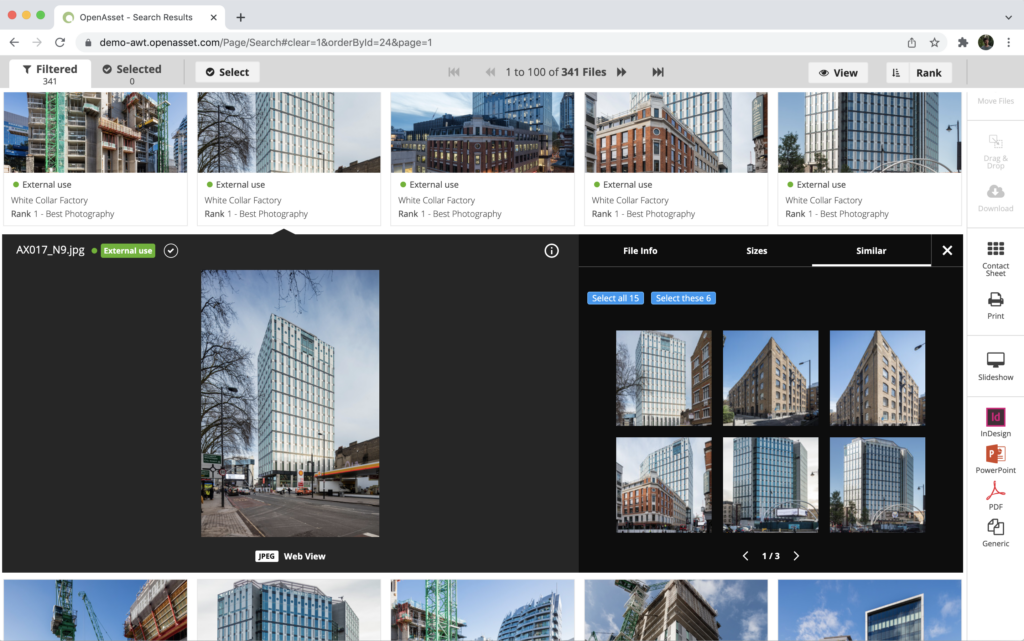
TIP: Great images are essential to closing business in all of your construction company’s materials. When it comes to your proposals, image management through a robust DAM can enhance efficiency and collaboration. Learn how OpenAsset did exactly that for Arcadis IBI Group.
Use Effective CTAs
When executed effectively, calls-to-action (CTAs) do more than just help in selling; they guide users through your website with creativity and clear descriptions, facilitating their conversion into qualified leads.
Additionally, don’t forget to include a powerful CTA button in your newsletters and other email communications. This is a crucial element as it plays a key role in instructing prospects on the next steps.
Ensure CTAs are clear, compelling, and provide value. Rather than using generic CTA buttons, go for action phrases that emphasize the benefit to the customer. For example, replace a standard ‘Buy Now’ with something more compelling like ‘Claim My 30% Discount Now’.
Moreover, CTAs are critical for Conversion Rate Optimization (CRO). They guide potential clients through the buyer’s journey, from visitor to lead, to customer. A well-placed CTA can be the difference between a user leaving the site and one who contacts your firm for a quote.
Utilize Analytics and Tracking
To understand the effectiveness of marketing efforts, it’s important to utilize analytics and tracking. Keep track of and analyze user activities on your platforms to refine your marketing strategies.
Tracking and analyzing help you understand your audience better and enhance the service you provide to them. It also provides insights, such as when users complete a form or subscribe to a newsletter, helping you identify which marketing tactics are leading to the best results.
Tools like Google Analytics can provide insights into website traffic, user behavior, and campaign performance. By regularly reviewing this data, construction companies can identify what’s working, and what’s not, and where to invest their marketing budget for the highest return.
Segment Your Audience for Targeted Marketing
Targeting is about making sure the right people see your message. Going back to paid social media advertising, a primary advantage of using it lies in the precision with which you can target specific markets for your ads. This capability enables companies to conduct various campaigns tailored to distinct market segments, helping you find highly qualified leads.
By segmenting your audience based on demographics, location, or behavior, construction companies can create more personalized, effective marketing campaigns. For example, residential construction marketing will differ from commercial construction marketing in tone, content, and channels used.
Additionally, paid search advertising offers businesses the opportunity to promote their websites in response to specific search terms entered by users.
Secure Features With Building Materials Companies
Getting featured by building material companies can provide credibility and exposure. Collaborate with building material companies for mutual promotion. Highlight the products you use in your projects across your channels, and in turn, let these suppliers showcase your projects on their platforms.
By collaborating on projects and showcasing them, both your firm and the material suppliers can benefit. You can offer to feature their products in your case studies or blog posts in exchange for being featured on their platforms, potentially reaching a larger and more diverse audience.
Various building material companies maintain a directory of construction firms that use their supplies, offering an excellent opportunity to enhance your brand’s visibility.
So, how can you get featured? Put together a list of your suppliers of building materials and contact them with a concise, well-crafted email. In this communication, describe the value their products have brought to your business and ask if they would be willing to include your company on their website.
Marketing for Construction Companies Made Easier
The challenges in construction marketing are as diverse as the solutions. But one thing stands clear: the right tools can make a significant difference. This is where OpenAsset comes in, proving to be more than just a digital asset management tool—it’s necessary for efficient, impactful marketing for your construction company.
OpenAsset simplifies the process of managing and using high-quality images, an essential element of any successful construction marketing strategy. From enhancing your online presence with engaging photos to creating compelling proposals, OpenAsset ensures that your AEC marketing collateral is always updated and looks its best.
By organizing and optimizing your digital assets, OpenAsset allows you to focus on what you do best—building and designing the future.
As the technology in the construction industry continues to change and improve, the role of sophisticated yet user-friendly tools like OpenAsset becomes increasingly important. By embracing such tools, you can get ahead of the competition and win more proposals.
OpenAsset isn’t just a platform; it’s a partner in your marketing and proposal journey, helping you to build a stronger, more visible, and more engaging business.
Ready to grow your business?



